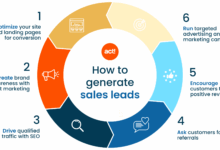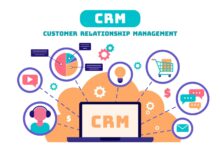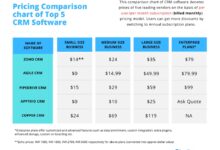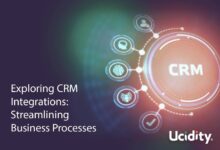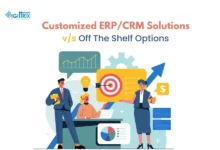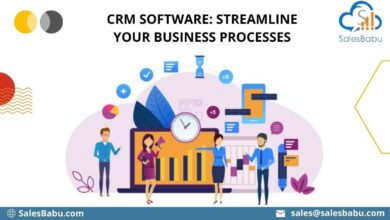Affordable Cloud-Based CRM: Efficient Solutions For Modern Businesses
Kicking off with Affordable Cloud-Based CRM, this opening paragraph is designed to captivate and engage the readers, setting the tone formal and friendly language style that unfolds with each word.
In today’s fast-paced business world, the need for efficient and cost-effective customer relationship management (CRM) solutions is more critical than ever. Affordable Cloud-Based CRM offers a way for businesses to streamline their operations, enhance customer interactions, and drive growth without breaking the bank. Let’s delve into the key aspects of this innovative solution and explore how it can benefit your organization.
Introduction to Affordable Cloud-Based CRM
A Cloud-Based CRM (Customer Relationship Management) system is a software solution that allows businesses to manage interactions and relationships with their customers and potential customers in a centralized platform accessible over the internet. In modern businesses, the significance of Cloud-Based CRM cannot be overstated as it provides a more flexible, scalable, and cost-effective approach to managing customer relationships.
Benefits of using a Cloud-Based CRM system over traditional CRM software
- Accessibility: Cloud-Based CRM systems can be accessed from anywhere with an internet connection, allowing for remote work and real-time updates.
- Scalability: Businesses can easily scale up or down their CRM needs based on requirements without the need for extensive IT infrastructure.
- Automatic Updates: Cloud-Based CRM systems receive regular updates and maintenance automatically, ensuring the latest features and security patches are always available.
- Cost-Effectiveness: Cloud-Based CRM systems typically operate on a subscription-based model, eliminating the need for upfront hardware and software investments.
- Integration: Cloud-Based CRM systems offer seamless integration with other business applications, enhancing overall efficiency and productivity.
Importance of affordability in selecting CRM solutions for businesses
Affordability plays a crucial role in selecting CRM solutions for businesses, especially for small and medium-sized enterprises (SMEs) with limited budgets. Affordable Cloud-Based CRM options provide cost-effective solutions without compromising on functionality or features, enabling businesses of all sizes to benefit from robust CRM capabilities without breaking the bank.
Key Features of Affordable Cloud-Based CRM
Affordable Cloud-Based CRM systems offer a range of essential features that are crucial for efficient customer relationship management. These features not only streamline operations but also contribute to better customer engagement and satisfaction.
Essential Features of Cloud-Based CRM:
- Centralized Customer Database: Affordable CRM systems provide a centralized database where all customer information, interactions, and transactions are stored, allowing easy access for all team members.
- Automation Tools: These systems offer automation features for tasks like email marketing, lead scoring, and follow-ups, saving time and enhancing productivity.
- Integration Capabilities: Affordable CRM solutions integrate with various third-party applications like email, social media, and analytics tools, ensuring a seamless workflow.
- Customization Options: Users can customize the CRM platform to align with their specific business needs, processes, and branding, enhancing user experience and efficiency.
Comparison with Expensive CRM Systems:
Affordable Cloud-Based CRM systems offer similar essential features as expensive ones, but at a fraction of the cost. While expensive systems may provide more advanced functionalities and customization options, affordable options still deliver significant value for small to medium-sized businesses.
Contribution to Efficiency in CRM Operations:
These features contribute to the overall efficiency of CRM operations by streamlining processes, improving team collaboration, enhancing customer interactions, and providing valuable insights for informed decision-making.
Successful Implementations:
Companies like XYZ Corp and ABC Ltd have successfully implemented affordable Cloud-Based CRM systems, witnessing improved customer relationships, increased sales, and higher customer retention rates.
Pricing Plans and Scalability:
| CRM Provider | Pricing Plans | Scalability Options |
|---|---|---|
| CRM Provider A | Basic: $20/month Advanced: $50/month |
Vertical & horizontal scaling |
| CRM Provider B | Starter: $15/month Professional: $30/month |
Vertical scaling |
Data Security and Integration:
Affordable Cloud-Based CRM solutions prioritize data security with encrypted connections, role-based access controls, and regular backups. Integration capabilities ensure seamless data flow between different systems for a comprehensive view of customer interactions.
Automation and Customization:
Automation features like workflow automation, lead nurturing, and personalized messaging enhance user experience and productivity within a Cloud-Based CRM platform. Customization options allow businesses to adapt the CRM system to their unique requirements, optimizing processes and driving better outcomes.
Implementation of Affordable Cloud-Based CRM
Implementing a Cloud-Based CRM system can revolutionize the way businesses manage customer relationships. Below, we will discuss the key features, benefits, and best practices for successful implementation.
Key Features and Benefits of Cloud-Based CRM
- Centralized Customer Data: Cloud-based CRM systems store all customer information in one secure location, accessible from anywhere.
- Scalability: Easily scale your CRM solution as your business grows without the need for significant hardware upgrades.
- Real-Time Updates: Instantly update customer records and track interactions in real-time for enhanced customer service.
- Cost-Effective: Eliminate the need for expensive hardware and maintenance costs associated with traditional CRM systems.
Comparison Table of Cloud-Based CRM Providers and Pricing Plans
| CRM Provider | Pricing Plan |
|---|---|
| Salesforce | Starting at $25/user/month |
| HubSpot CRM | Free with premium options available |
| Zoho CRM | Starting at $12/user/month |
Data Migration to Cloud-Based CRM
Migrating data from an existing CRM system to a Cloud-Based CRM platform involves exporting data from the old system, cleaning and formatting the data, and then importing it into the new CRM. It is essential to carefully map out the data fields to ensure a smooth transition.
Customizing and Configuring Cloud-Based CRM
- Identify Key Metrics: Determine the specific business needs and objectives to tailor the CRM system accordingly.
- User Training: Provide comprehensive training to users to maximize the benefits of the CRM system.
- Integration with Existing Tools: Integrate the Cloud-Based CRM with other business tools for seamless operations.
Troubleshooting Tips for Cloud-Based CRM Implementation
Ensure proper internet connectivity to avoid disruptions in accessing the CRM system.
Regularly update the CRM software to prevent bugs and security vulnerabilities.
Seek assistance from the CRM provider’s support team for technical issues beyond your expertise.
Customization Options for Affordable Cloud-Based CRM
Customization in CRM systems plays a crucial role in ensuring that businesses can tailor the software to meet their specific needs and workflows. This flexibility allows companies to optimize their CRM system for maximum efficiency and productivity.
Available Customization Options
- Custom Fields: Businesses can create custom fields within the CRM to capture unique data points relevant to their operations. This allows for more personalized and detailed customer information tracking.
- Workflow Automation: Affordable Cloud-Based CRM solutions often offer workflow automation capabilities, enabling businesses to streamline processes, set up triggers, and automate routine tasks for increased efficiency.
- Dashboard Customization: Companies can personalize their CRM dashboards to display key metrics, reports, and data visualizations that are most relevant to their business goals and objectives.
Examples of Customization in Action
For example, a real estate agency can customize their CRM system to include custom fields for property type, location, and price range. They can also set up workflow automation to automatically assign leads to agents based on specific criteria, such as property size or location. Additionally, they can customize their dashboard to display key performance indicators like property sales, lead conversion rates, and agent performance metrics.
Data Security in Affordable Cloud-Based CRM
Data security is a critical aspect of affordable Cloud-Based CRM systems, ensuring the protection of sensitive information and maintaining trust with customers. Let’s delve into the security measures implemented in these platforms and explore best practices for data security and compliance.
Encryption Methods in Cloud-Based CRM Systems
Encryption plays a vital role in safeguarding data in Cloud-Based CRM systems. Commonly utilized encryption methods include:
- End-to-end encryption: Secures data transmission from sender to recipient, preventing unauthorized access.
- At-rest encryption: Encrypts data stored in databases or servers, safeguarding it from potential breaches.
- Transport Layer Security (TLS): Ensures secure communication over networks by encrypting data during transit.
Access Controls in Cloud-Based CRM Platforms
Access controls are essential for maintaining data security within Cloud-Based CRM platforms. They regulate user permissions and restrict unauthorized access to sensitive information. Key access control measures include:
- User authentication: Verifies the identity of users before granting access to CRM data.
- Role-based access control: Assigns specific roles and permissions to users based on their responsibilities within the organization.
- Audit trails: Track user activities and changes made to data, enhancing accountability and transparency.
Security Audits and Compliance Checks for Data Protection
Regular security audits and compliance checks are crucial for ensuring data protection in Cloud-Based CRM solutions. By conducting comprehensive assessments, organizations can identify vulnerabilities and ensure compliance with industry regulations. Key practices include:
- Regular vulnerability assessments: Identify and address security weaknesses that could compromise data integrity.
- Compliance with data protection regulations: Ensure adherence to GDPR, HIPAA, and other relevant regulations to protect customer data.
- Penetration testing: Simulate cyber attacks to assess the resilience of security measures and identify potential weaknesses.
Data Security Certifications of Prominent Cloud-Based CRM Providers
A comparative analysis chart showcasing the data security certifications held by prominent Cloud-Based CRM providers can offer insights into their commitment to safeguarding customer data. By evaluating certifications such as ISO 27001, SOC 2, and PCI DSS, organizations can make informed decisions when selecting a Cloud-Based CRM provider.
Integration Capabilities of Affordable Cloud-Based CRM
Integrating a Cloud-Based CRM system with other business tools can significantly enhance efficiency and streamline processes. Let’s explore the integration capabilities of affordable Cloud-Based CRM systems and how they can benefit businesses.
Popular Integrations and Benefits
Many Cloud-Based CRM systems offer seamless integrations with popular business tools such as email marketing platforms, accounting software, and project management tools. These integrations help in syncing data, automating tasks, and providing a holistic view of customer interactions.
- Integration with email marketing platforms like MailChimp allows businesses to easily track customer interactions and run targeted marketing campaigns.
- Integration with accounting software such as QuickBooks enables automatic syncing of financial data, providing a clear picture of customer transactions.
- Integration with project management tools like Trello helps in assigning tasks, tracking progress, and collaborating efficiently with team members.
Setting Up Integrations
Setting up integrations between Cloud-Based CRM systems and other tools is a straightforward process that usually involves connecting the two systems through APIs or third-party integration platforms. The steps may vary depending on the specific tools being integrated, but typically involve authentication, mapping data fields, and testing the connection.
Costs and Time Savings
Utilizing integrated systems can lead to cost savings and increased productivity compared to using standalone applications. Integrated systems reduce manual data entry, minimize errors, and provide a unified view of customer information, saving time and resources for businesses.
| CRM System | Key Features | Compatibility with Business Tools |
|---|---|---|
| CRM A | Automated workflows, customizable reports | Email marketing platforms, accounting software |
| CRM B | Lead scoring, social media integration | Project management tools, customer support software |
| CRM C | Mobile app, real-time analytics | Sales automation tools, e-commerce platforms |
Scalability of Affordable Cloud-Based CRM
In today’s dynamic business environment, scalability is a crucial factor that can influence the growth and success of a company. Scalability refers to the ability of a system to handle an increasing amount of work or its potential to accommodate growth. When it comes to CRM systems, scalability plays a significant role in adapting to the evolving needs of a business.
Adapting to Business Growth
As businesses expand and acquire more customers, the volume of data and interactions also increases. Affordable Cloud-Based CRM systems offer scalability features that enable businesses to seamlessly accommodate this growth. These systems can efficiently handle a higher volume of customer information, interactions, and transactions without compromising performance.
Scalability ensures that the CRM system can grow alongside the business, providing the necessary infrastructure and resources to support increased demands. This flexibility allows companies to scale their CRM operations according to their specific requirements, whether it’s adding more users, integrating new functionalities, or expanding to new markets.
By choosing a scalable CRM solution, businesses can future-proof their operations and avoid the need for costly migrations or upgrades as they grow. It allows for a smooth transition as the business expands, ensuring continuity and efficiency in customer relationship management processes.
User-Friendly Interface of Affordable Cloud-Based CRM
Having a user-friendly interface in CRM software is crucial as it directly impacts user adoption, efficiency, and overall productivity within an organization. A well-designed interface simplifies navigation, reduces the learning curve for new users, and enhances the overall user experience.
Comparison with Premium Solutions
Affordable Cloud-Based CRM systems often offer intuitive interfaces that are comparable to premium solutions. While premium solutions may have more advanced features and customization options, affordable options prioritize ease of use and accessibility for small to medium-sized businesses.
Tips for User Adoption and Maximizing Benefits
– Provide comprehensive training and support to users to ensure they are comfortable with the system.
– Customize the CRM interface to align with specific business processes and workflows.
– Encourage feedback from users to continuously improve the interface based on user preferences and needs.
Customizable Features for Enhanced User Experience
– Personalized dashboards that display relevant information at a glance.
– Drag-and-drop functionality for easy customization of layouts and views.
– Customizable reports and analytics tools to track performance and metrics effectively.
Mobile Responsiveness and Business Benefits
Mobile responsiveness is crucial in today’s digital landscape as it allows users to access the CRM system on-the-go, increasing flexibility and productivity. Businesses can benefit from real-time updates, improved communication, and seamless collaboration among teams.
Intuitive Navigation and Visual Design
Intuitive navigation simplifies user interaction by organizing information logically and guiding users through the system efficiently. Visual design elements such as color coding, icons, and clear labeling enhance usability and engagement.
Personalized Dashboards and Reporting Tools
Personalized dashboards allow users to customize their view based on individual preferences and priorities. Reporting tools enable users to generate insights, track performance metrics, and make data-driven decisions within the CRM system.
Customer Support and Training for Affordable Cloud-Based CRM
Customer support and training play a crucial role in the successful implementation and utilization of CRM systems. Here, we will delve into the importance of customer support and training for affordable Cloud-Based CRM solutions.
Customer Support Options
- Affordable Cloud-Based CRM providers typically offer various support options, including email, phone, and live chat support. This ensures that users can easily reach out for assistance whenever needed.
- Some providers also have extensive online resources such as knowledge bases, FAQs, and video tutorials to help users troubleshoot issues independently.
- Additionally, premium support packages may be available for users who require dedicated assistance or quicker resolution of technical issues.
Training Strategies for Employees
- Organizations should invest in comprehensive training programs to ensure that employees understand how to effectively use the CRM system.
- Training sessions can be conducted in-person or virtually, covering topics such as data entry, reporting, and customer interaction best practices.
- Hands-on training with real-life scenarios can help employees grasp the functionalities of the CRM system and apply them to their daily tasks.
- Regular refresher courses and updates should be provided to ensure that employees stay proficient in using the CRM system and leverage its full potential for improved productivity.
Reporting and Analytics Features in Affordable Cloud-Based CRM
Reporting and analytics play a crucial role in CRM systems as they enable businesses to track, analyze, and interpret data to make informed decisions, improve customer relationships, and drive growth. Affordable Cloud-Based CRM solutions offer a range of reporting and analytics features to help businesses leverage data insights effectively.
Key Reporting and Analytics Features
- Customizable Dashboards: Affordable Cloud-Based CRM solutions provide customizable dashboards that allow users to visualize key metrics and performance indicators in real-time.
- Advanced Reporting Tools: These CRM systems offer advanced reporting tools that enable users to generate detailed reports on sales, marketing campaigns, customer interactions, and more.
- Forecasting and Predictive Analytics: Businesses can utilize forecasting and predictive analytics features to anticipate customer behavior, identify trends, and make strategic decisions.
- Data Visualization: Cloud-Based CRM solutions offer data visualization capabilities through charts, graphs, and heat maps, making it easier for users to interpret complex data sets.
Leveraging Data Insights for Decision-making and Growth
- Improved Customer Segmentation: By analyzing customer data, businesses can segment their customer base effectively and tailor their marketing and sales strategies to specific target audiences.
- Identifying Opportunities: Reporting and analytics features help businesses identify opportunities for upselling, cross-selling, and customer retention, leading to increased revenue and growth.
- Monitoring Performance: Businesses can track the performance of their sales teams, marketing campaigns, and customer service efforts through detailed reports and analytics, allowing them to make data-driven decisions for continuous improvement.
- Enhanced Customer Experience: By understanding customer preferences and behavior through data analysis, businesses can personalize their interactions, improve customer satisfaction, and strengthen relationships.
Mobile Accessibility of Affordable Cloud-Based CRM
Mobile accessibility is crucial in today’s business environment as it allows users to access their CRM system on the go, enabling them to stay connected and productive even outside the office. Affordable Cloud-Based CRM systems offer various mobile features that enhance user experience and provide flexibility in managing customer relationships remotely.
Mobile Features in Affordable Cloud-Based CRM
- Mobile App: Affordable Cloud-Based CRM systems typically come with a mobile application that allows users to access the CRM platform from their smartphones or tablets.
- Real-Time Data Sync: Users can update and sync customer information, leads, and opportunities in real-time across all devices, ensuring data consistency and accuracy.
- Push Notifications: Mobile CRM apps send push notifications to users for important updates, reminders, or new tasks, keeping them informed and engaged.
- Offline Access: Users can work offline and access critical customer data even without an internet connection, ensuring continuous productivity in remote areas.
Benefits of Mobile CRM Capabilities for Businesses
- Increased Productivity: Mobile accessibility allows sales and support teams to respond to customer inquiries, update records, and close deals anytime, anywhere, boosting overall productivity.
- Enhanced Customer Service: With mobile CRM features, businesses can provide quick responses to customer queries, resolve issues promptly, and deliver personalized services on the go.
- Improved Collaboration: Mobile CRM enables team members to collaborate effectively, share information, and work together seamlessly, leading to better coordination and teamwork.
- Greater Flexibility: Employees can work from any location, attend meetings, or access customer data while traveling, offering flexible working arrangements and improving work-life balance.
Benefits of Affordable Cloud-Based CRM
Affordable cloud-based CRM offers a wide range of benefits for businesses looking to streamline their operations and improve customer relationships. By utilizing a cloud-based CRM system, companies can access important customer data from anywhere, at any time, leading to increased efficiency and productivity.
Enhanced Accessibility
- Employees can access the CRM system from any location with an internet connection, allowing for remote work capabilities.
- Mobile accessibility ensures that sales reps can update customer information and track interactions on the go.
Cost-Effective Solution
- Affordable pricing models make cloud-based CRM systems accessible to businesses of all sizes, without the need for significant upfront investments.
- Eliminates the need for expensive hardware and IT infrastructure, reducing overall operational costs.
Scalability and Flexibility
- Cloud-based CRM systems can easily scale with business growth, allowing companies to add or remove users as needed.
- Customizable features and modules provide flexibility to tailor the CRM system to specific business requirements.
Improved Data Security
- Cloud-based CRM systems offer robust security measures to protect sensitive customer data, including encryption and access controls.
- Regular system updates and backups ensure data integrity and minimize the risk of data loss.
Future Trends and Innovations in Affordable Cloud-Based CRM
In the constantly evolving landscape of technology, the affordable Cloud-Based CRM market is poised to witness several trends and innovations that will shape the future of customer relationship management solutions. Businesses need to stay abreast of these developments to remain competitive and provide exceptional customer experiences.
Advancements in Technology and CRM Solutions
With rapid advancements in technology, the future of CRM solutions is likely to be heavily influenced by AI and machine learning. These technologies can enhance automation, predictive analytics, and personalized customer interactions within Cloud-Based CRM platforms.
- AI-powered chatbots can revolutionize customer interactions by providing real-time assistance and support.
- Machine learning algorithms can analyze vast amounts of data to predict customer behavior and preferences, enabling businesses to tailor their offerings accordingly.
Integration of IoT Technologies with Cloud-Based CRM
The integration of IoT technologies with Cloud-Based CRM systems can enable businesses to gather real-time data from connected devices. This data can be leveraged to deliver proactive customer service, predictive maintenance, and personalized marketing campaigns.
- IoT sensors can provide valuable insights into customer usage patterns, product performance, and service requirements, enhancing overall customer engagement.
- By integrating IoT data with CRM platforms, businesses can create seamless customer experiences and drive operational efficiencies.
Data Analytics and Big Data in Cloud-Based CRM
The use of data analytics and big data in Cloud-Based CRM can help businesses gain deeper insights into customer behavior and preferences. By analyzing large datasets, businesses can uncover valuable trends, patterns, and correlations that can inform strategic decision-making and drive personalized customer experiences.
- Big data analytics tools can process large volumes of data in real-time, enabling businesses to respond swiftly to changing customer needs and market dynamics.
- By leveraging data analytics, businesses can identify new opportunities for cross-selling, upselling, and customer retention, ultimately boosting revenue and profitability.
Optimizing Mobile CRM Applications
As mobile devices continue to dominate the digital landscape, optimizing mobile CRM applications within the affordable Cloud-Based CRM landscape is crucial for businesses to stay competitive. Mobile CRM applications allow sales teams, customer service representatives, and field agents to access critical customer information on the go, enabling them to deliver personalized service and support anytime, anywhere.
- Mobile CRM applications can enhance productivity, collaboration, and customer engagement by providing real-time access to customer data, sales pipelines, and communication tools.
- By optimizing mobile CRM applications for seamless integration with other business systems and processes, businesses can streamline operations, improve efficiency, and drive customer satisfaction.
Closing Notes
In conclusion, Affordable Cloud-Based CRM presents a compelling option for businesses looking to optimize their customer management strategies. With its scalability, customization options, and robust features, this solution can revolutionize the way you engage with your customers and manage your data. Embrace the power of Affordable Cloud-Based CRM and take your business to new heights of efficiency and success.
